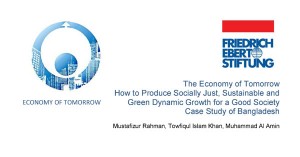Friedrich Ebert Stiftung (FES) Economy of Tomorrow Series paper authored by Mustafizur Rahman, Towfiqul Islam Khan, Muhammad Al Amin.
Bangladesh has been able to raise its GDP growth rate by at least one percent for each of the past three decades. The challenge now is to accelerate economic growth to eight to ten percent over the foreseeable future. In order to do so, the drivers of growth need to be better prioritized. Bangladesh should strategically capitalize on the advantages of its growing domestic market, accelerate its efforts to bring about structural change in the economy, put the needed infrastructure in place, better develop human capabilities, create a conducive environment for job creating businesses, and strengthen institutional, legal and administrative capacities.
Bangladesh has achieved remarkable progress in reducing poverty by approximately two percent each year during the 2000s. However, extreme poverty remains persistent and income and wealth inequality have become major concerns. Strengthening the capacities of marginalized people through quality education, as well as the provision of good health services and measures to promote income earning capacity of people still living in poverty need to be prioritized.
The increasingly open economy of Bangladesh must be prepared to take advantage of the opportunities emerging in regional and global markets through export and market diversification, moving up the value chain by raising labor and capital productivity, creating decent jobs and ensuring labor rights and workplace safety.
For the future growth of Bangladesh to be dynamic and green, the utilization of natural resources in an environmentally sustainable manner, addressing the challenges arising from climate change, limiting ecosystem degradation, the conservation of biodiversity, enhancement of afforestation and integrated coastal zone management, and addressing environmental health problems needs to be placed high on the country’s policy agenda.
Published in March 2014.


